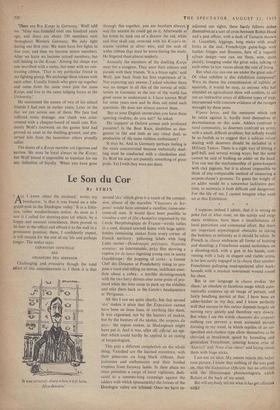Le Son du Cor
By STRIX 'AL I know about the enclosed,' writes my benefactor, `is that it was found on a tele- graph-post in .the Dordogne valley.' It is a folio- size, rather weatherbeaten notice. As soon as I saw it I called for drawing-pins (of which, by a happy and unusual coincidence, there proved to be four in the office) and affixed it to the wall in a prominent position; there, I confidently expect, it will remain for the rest of my life and perhaps longer. The notice says:
EXPOSITION OFFICIELLE DES CHASSEURS DES SERPENTS
Challenging and evocative though the total effect of this announcement is, I think it is that it was certainly sharp when it left here, Miss Borden.' second 'des' which gives it a touch of the compul- sive, almost of the macabre. `Chasseurs de Ser- pents' would have sounded a carefree, come-one- come-all note. It would have been possible to visualise a sort of fete champetre organised by the Cercle Herpetologique de France—trestle tables in a cool, disused sawmill laden with huge spirit- bottles containing snakes from every corner of French territory : yellowing labels with long Latin names—Dendroaspis polylepsis, Notechis scutatus: an interminable, jerky film showing a captive ler de lance ingesting young rats in sunny Guadeloupe: the popping of corks: a former Chef des Douanes at Pondicherry rising to pro- pose a toast and telling an untrue, indelicate anec- dote about a cobra : a terrible shouting-match with the two lorry drivers over some point of pro- tocol when the time came to pack up the exhibits and take them back to the Cercle's headquarters at Perigueux. . . .
All this I can see quite clearly, but that second `des' makes it plain that the Exposition cannot have been on these lines, or anything like them. It was organised, not by the hunters of snakes, but by the hunters of the snakes, the serpents du pays: the region snakes, as Shakespeare might have put it. And it was, after all, official, an epi- thet which could hardly be applied to an outing of herpetologists.
This puts a different complexion on the whole thing. Vanished are the learned eccentrics, with their pince-nez on long black ribbons, their jealousies and enthusiasms and their bottled trophies from faraway lands. In their place we must postulate a corps of local vigilantes, dedi- cated to a summer-long campaign against the adders with which (presumably) the forests of the Dordogne valley are infested. Once we have re- adjusted our sights, these hardy fellows define themselves as a sort of cross between Robin Hood and a pest officer, with a dash of Tartarin throw n in. Gauntlets, leggings, long sticks with small forks at the end, French-type game-bags with leather fringes and flounces, hats of a vaguely sylvan design—one can see them, now, quite plainly, lounging under the great oaks, talking to each other in low voices about the cost of living.
But what else can one see under the great oaks? Of what exhibits is this exhibition composed? Were its theme the extermination of rabbits or squirrels, it would be easy, as anyone who has attended an agricultural show will confirm, to set- out an instructive array of different types of trap, interspersed with concrete evidence of the ravages wrought by these pests.
Vipera bents, and the measures which can be taken against it, hardly lend themselves to dramatisation on this scale. Adders confront a rural community, its deserters confront an army, with a small, difficult problem; but nobody would be so foolish as to suggest that a tableau vivant dealing with deserters should be included in a Military Tattoo. There is a right way of hitting a golf-ball, and several wrong ways; but the same cannot be said of bashing an adder on the head. You can test the marksmanship of game-keepers with clay pigeons, but it is almost impossible to think of any comparable method of measuring a serpent-chaser's prowess. To guess the weight of an adder would be a somewhat lacklustre pas- time, to ascertain it both difficult and dangerous. For the life of me, 1 cannot imagine what went on at this Exhibition.
I suppose,- indeed I admit, that it is wrong to poke fun at what must, on the scanty and enig- matic evidence, have been a manifestation of local patriotism and communal effort. But there are important etymological obstacles to taking the business as seriously as it should be taken. In French la chasse embraces all forms of hunting and shooting; a Frenchman seated motionless on a shooting-stick with a gun in his hands, con- versing with a lady in elegant and risible attire, is no less surely engaged in la chasse than another Frenchman galloping mud-spattered after buck- hounds with a musical instrument wound round his chest.
But in our language la chasse evokes 'the chase,' an obsolete or facetious usage which auto- matically conjures up an image of pursuit, and fairly headlong pursuit at that. 1 have been an adder-basher in my day, and I know perfectly well that success in this métier depends largely on moving very quietly and therefore very slowly. But when 1 see the words chasseurs des serpents nothing can prevent a most animated picture forming in my mind, in which reptiles of an un- specified and clueless type allow themselves to be chivvied at breakneck speed by bounding and gesticulant Frenchmen, uttering hoarse cries of 'Sapristi!' and `Nom dun chien!' and laying about them with huge sticks.
I am not an idiot. My reason rejects this ludic- rous picture. I know that nothing of the sort goes on, that the Exposition Officielle has no affinities with the Disneyesque phantasmagoria which flickers at the back of my mind.
But will anybody tell me what it has got affinities with?


































 Previous page
Previous page